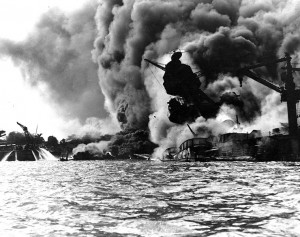 OP-ED: When FDR declared December 7, 1941, “a date that will live in infamy,” he left no question about who the infamous party was. The culprit in the “unprovoked and dastardly attack” on Pearl Harbor was the Japanese Empire.
OP-ED: When FDR declared December 7, 1941, “a date that will live in infamy,” he left no question about who the infamous party was. The culprit in the “unprovoked and dastardly attack” on Pearl Harbor was the Japanese Empire.
For many, though, Roosevelt’s explanation makes sense. The world was already at war, our diplomatic efforts to resolve tensions with Japan had failed, and the entire Pacific Ocean was ready to boil over.
To some revisionists, a more ominous explanation than Roosevelt’s seemed obvious. They claimed that Roosevelt knew in advance about the attack on Pearl Harbor and deliberately withheld information from the U.S. commanders in Hawaii. What were his motives? According to them, it was to get the United States in the war. To frustrated isolationists in Congress and many in the American public, Roosevelt was a warmonger who would stop at nothing, not even betraying his own forces, to get his way.
Among the earliest to point fingers at Roosevelt were his commanders at Pearl Harbor: Adm. Husband Kimmel, the commander-in-chief of the US Pacific Fleet, and Lieut. Gen. Walter Short, Commanding General, Hawaii Department of the Army. Both had strong incentive to blame Roosevelt (or for that matter, anyone but themselves). The defeat at Pearl Harbor had been compounded by a presidential committee that found of Kimmel and Short guilty of “dereliction of duty.”
Neither officer took this verdict lying down. Most frustrating of all was that the committee had not considered the key evidence against Roosevelt—namely, Magic. Magic was the codename that referred to the brilliant code breaking work of Lt. Col. William Friedman. From 1940 on, as the result of Friedman’s breakthroughs, U.S. intelligence officers were reading all of Japan’s diplomatic messages.
One such intercepted message was from the Japanese Foreign Ministry to its Honolulu consulate. This came to be known as the “bomb plot” message. It read:
Strictly secret.
Henceforth, we would like to have you make reports concerning vessels along the following lines insofar as possible:
1) The waters (of Pearl Harbor) are to be divided roughly into five subareas (We have no objections to your abbreviating as much as you like.)
Area A. Waters between Ford Island and the Arsenal.
Area B. Waters adjacent to the Island south and west of Ford Island.
(This area is on the opposite side of the Island from Area A.)
Area C. East Loch.
Area D. Middle Loch.
Area E. West Loch and the communication water routes.
2) With regard to warships and aircraft carriers, we would like to have you report on those at anchor (these are not so important) tied up at wharves, buoys and in docks. (Designate types and classes briefly. If possible we would like to have you make mention of the fact when there are two or more vessels along side the same wharf.)
That the consulate was spying on American ships at Pearl Harbor was no surprise to anyone. Now, however, they were suddenly interested in the location of the ships in the harbor. Yet no one in the Army or Navy at Pearl Harbor received a copy of this intercepted message.
Kimmel and Short felt somewhat vindicated when the Navy and the Army conducted their own investigations and concluded that their commanders had not been derelict. But that satisfied few. For one thing, a lot of people suspect the military was covering up the truth to protect its own people and image. And even for those who did not trust the military, the question remained: if Kimmel and Short were to not blame, who was?
How could U.S. intelligence have failed to pass on such a critically important message to Kimmel or Short? In thirty-nine volumes of congressional committee testimony and documents, there is no definite answer. Various officers confirmed that the bomb plot message was definitely intercepted yet never reached Kimmel or Short.
The congressional committee’s verdict was split. The majority report, signed by six Democrats and two Republicans, blamed the military, both in Washington and in Hawaii. It blamed Army and Navy intelligence, and Washington for failing to pass on this and other intercepted Japanese messages to Kimmel and Short; it blamed Kimmel and Short for failing to appreciate the considerable intelligence and other information that was available to them.
In retrospect, the weight of evidence did support the majority opinion of the committee. No one conspired to keep Kimmel and Short in the dark. Instead, a great many people in Washington and Hawaii, including Roosevelt and most other top American officials, grossly underestimated the Japanese. It was a general underestimation of the Japanese, aided by bad communication, poor coordination, and plain bad luck, that was to blame for Pearl Harbor.
In one sense, however, the case against Roosevelt has stood the test of time. Most historians now agree that in his eagerness to get the United States into the war, Roosevelt was guilty both of provoking the Japanese and in overstepping his constitutional powers. In early 1941, well before Pearl Harbor and in violation of a neutrality act, the United States was providing covert aid to China in its war against Japan.
At the same time, allowing what happened at Pearl Harbor could not possibly have aided Roosevelt in his ultimate aim—to win the war. Had Japan succeeded, the entire US fleet would’ve been destroyed, probably enabling Japan to quickly settle for peace on its terms.
©2012 Off the Grid News